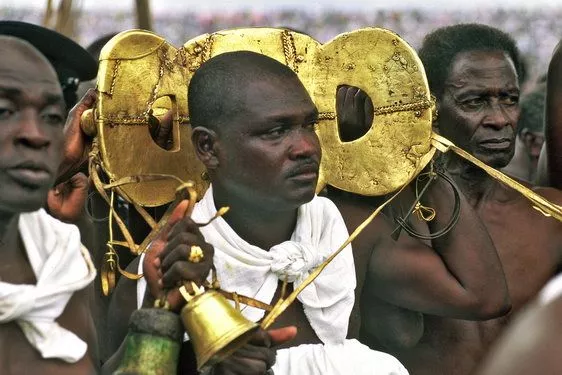The Ashanti Kingdom was a pre-colonial kingdom located in what is now modern-day Ghana. It was one of the largest and most powerful West African states, and its capital was located in Kumasi.
The kingdom was also ruled by the Ashanti monarch, the Asantehene, and its government was a constitutional monarchy with a powerful central authority. It was also known for its wealth, advanced political and social organization, and military prowess.
Related Articles
- Also Read: The Famous Symbols of the Hausa People and Their Culture
- Also Read: Fulani Traditional Clothing: A Cultural Exploration
- Also Read: Famous Historical Figures From the Ancient Benin Kingdom
- Also Read: Six Most Powerful Tribes In Nigeria
The Kingdom had a rich cultural heritage, and its traditions have been passed down through generations and continue to be celebrated today. Some of the key traditions of the Ashanti Kingdom include:
Adinkra Symbols
Adinkra symbols are visual symbols that were used to convey messages in the Ashanti Kingdom. They are now commonly used as decorative motifs in textiles, pottery, and other forms of art.
Kente Cloth
Kente cloth is a brightly colored, handwoven fabric that is considered to be a symbol of the Ashanti Kingdom. It is made using a complex weaving technique and is often used in traditional ceremonial dress.
Funerary Customs
The Ashanti Kingdom had a strong tradition of honoring the dead, and funerary customs played an important role in the kingdom’s culture. Funerals were elaborate affairs, with the body of the deceased being wrapped in cloth and carried to the cemetery in a procession.
Music and Dance
Music and dance were an important part of life in the Ashanti Kingdom, and traditional songs and dances were used to tell stories, mark important events, and celebrate the lives of the dead.
Traditional Medicine
The Kingdom had a rich tradition of traditional medicine, and healers used a variety of plants, herbs, and other natural remedies to treat illnesses and injuries.
Storytelling
Storytelling was an important tradition in the Ashanti Kingdom, and tales were passed down through generations. These stories often had moral or religious themes, and were also used to educate and entertain.
Festivals
The Kingdom celebrated a number of festivals throughout the year, including Homowo, which marked the beginning of the harvest season, and Odwira, which was also a celebration of the founding of the kingdom.
In conclusion, the Kingdom and its traditions are an important part of Ghanaian history and culture. From the intricate woven designs of Kente cloth, to the elaborate funerary customs, the legacy of the Ashanti Kingdom continues to influence the culture of modern-day Ghana.

